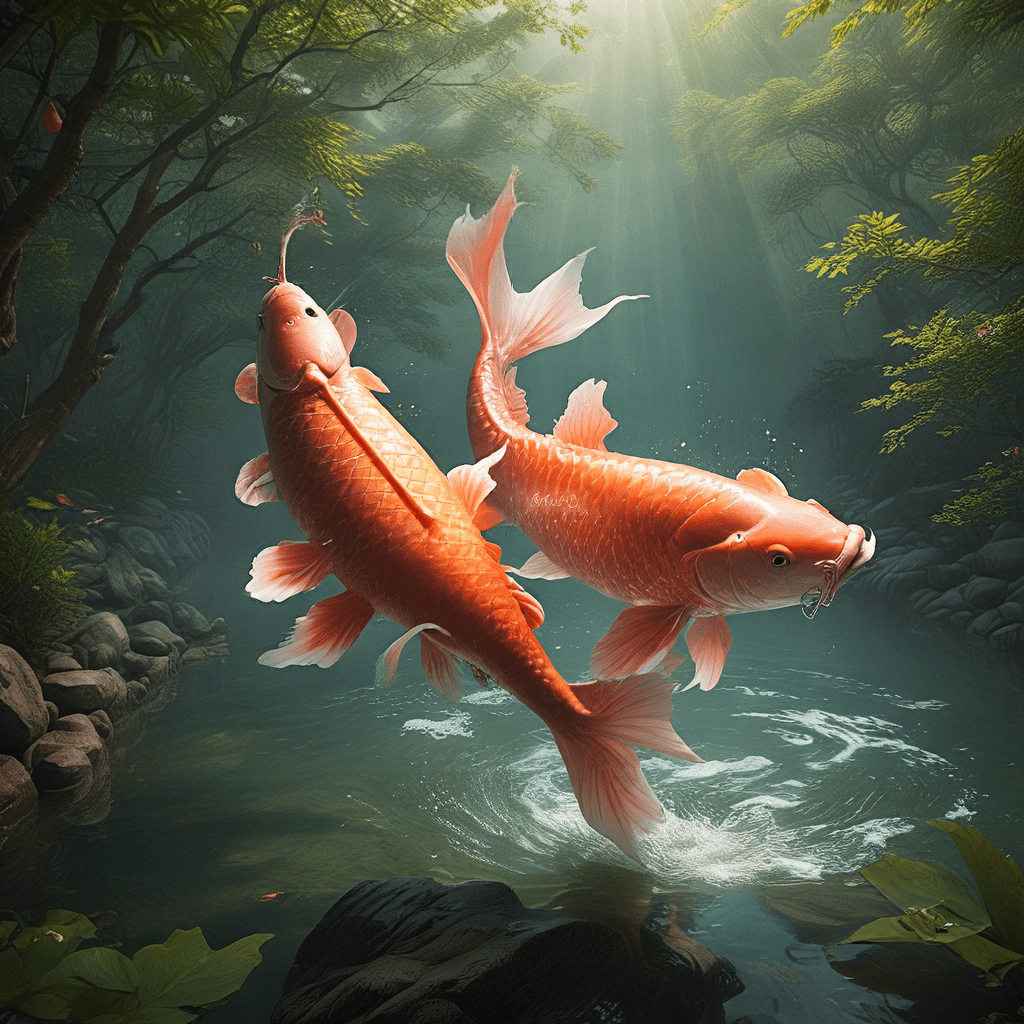The Carp: A Creature of Transformation and Abundance
In the rich tapestry of Korean folktales, the carp, a seemingly ordinary fish, takes on a mythical dimension, symbolizing transformation, perseverance, and abundance. More than just a creature of the water, the carp transcends its physical form, becoming a powerful symbol that resonates deeply within Korean culture. The carp’s presence in stories and legends reveals a profound connection between humans and the natural world, underscoring the enduring power of hope and resilience.
The Carp in Korean Mythology: Beyond a Simple Fish
In Korean mythology, the carp is much more than a simple fish. It embodies the potential for growth, change, and reaching for higher aspirations. This symbolism is woven into the very fabric of Korean society, influencing art, literature, and traditional beliefs. The carp's journey, both literal and metaphorical, mirrors the human experience of striving for betterment and overcoming challenges. The carp's transformation into a dragon, a creature revered for its power and wisdom, represents the ultimate culmination of this journey.
The Carp’s Journey to Dragonhood: A Symbol of Perseverance and Ascension
One of the most enduring motifs in Korean folklore is the carp’s transformation into a dragon. This mythical journey, known as "Yeongungyo," embodies the spirit of perseverance and the power of determination. The carp, swimming upstream against the current, faces numerous obstacles on its path to becoming a dragon. Its unwavering determination to reach the Dragon Gate, a mythical waterfall, symbolizes the human spirit's ability to overcome adversity and achieve greatness. Reaching the Dragon Gate signifies not only physical ascension but also spiritual enlightenment and transformation.
The Carp as a Harbinger of Good Fortune and Prosperity
The carp's journey to dragonhood also links it to themes of good fortune and prosperity. In Korean culture, the carp is associated with abundance, wealth, and success. The fish's abundance in rivers and lakes is seen as a reflection of the bounty of nature, while its strength and tenacity symbolize the power of human ambition. The carp's upward movement is seen as a positive omen, signifying progress, growth, and success in all areas of life. For centuries, Koreans have used the carp as a symbol of good fortune in various aspects of their lives, from business to academic pursuits.
The Mythical Carp in Korean Folktales: A Repository of Traditional Beliefs
Korean folktales provide a rich source of information about the mythical carp and its place in traditional beliefs. These stories offer insights into the values, aspirations, and fears of Korean society. Through the lens of folklore, we see how the carp has been used to explain natural phenomena, teach moral lessons, and provide hope for the future. The carp, with its transformative power and association with prosperity, serves as a powerful reminder of the potential that lies within each individual and the importance of striving for excellence.
The Role of the Carp in Rituals and Festivals: Connecting with the Supernatural
The mythical carp's symbolic power extends beyond folktales, deeply influencing Korean rituals and festivals. The carp's connection to abundance and prosperity has made it a central figure in many cultural celebrations. The most prominent example is the "Danggo Festival," held annually in the southeastern region of Gyeongsang. During this festival, people release carp-shaped paper lanterns into the sky, symbolizing their hopes and wishes for good fortune and a bountiful harvest. The release of these lanterns represents a symbolic offering to the spirits of the water, seeking their blessings for a prosperous year.
Another significant ritual involving the carp is the "Sanjo Ritual," performed in various regions of Korea. This ritual is believed to appease the spirits of the water and ensure the safety of fishermen at sea. During the Sanjo Ritual, participants offer food and wine to the spirits, often accompanied by traditional music and dance. The carp, as a symbol of abundance and a creature revered by the spirits of the water, plays a crucial role in these rituals, serving as a bridge between the human and supernatural worlds. These rituals demonstrate the profound connection between the mythical carp and traditional beliefs, highlighting the importance of honoring the natural world and seeking its blessings for prosperity and well-being.
The Carp in Contemporary Korean Culture: A Symbol of Resilience and Hope
The enduring power of the mythical carp's symbolism is evident in its continued presence in contemporary Korean culture. The carp's journey to dragonhood serves as a powerful metaphor for overcoming obstacles and achieving success, a message that resonates deeply with contemporary Koreans. This enduring symbol of perseverance and resilience is seen in various aspects of modern life, from art and literature to everyday objects like carp-shaped keychains and phone charms.
The carp also serves as an inspiring symbol of hope, particularly in times of adversity. The carp's unwavering determination to reach the Dragon Gate, despite the challenges it faces, serves as a reminder that even in the face of difficulty, progress and transformation are possible. In a society that places a high value on education and achievement, the carp's journey serves as a powerful motivator, inspiring individuals to overcome challenges and strive for their goals.
The Influence of Confucianism on the Mythical Carp: Emphasizing Harmony and Social Order
Confucianism, a prominent philosophical system in Korea, has significantly influenced the depiction and interpretation of the mythical carp. Confucian ideals of harmony, social order, and hierarchy are reflected in the carp's journey to dragonhood. The carp's ascension to a higher state of being is seen as a process of self-cultivation, mirroring Confucian principles of personal growth and ethical development.
The carp's unwavering determination to swim upstream, against the natural flow of the river, is interpreted as a symbol of ambition and the desire for social advancement. This aspiration for upward mobility aligns with Confucian ideals of social harmony and the pursuit of excellence. Additionally, the carp's transformation into a dragon, a creature associated with power and authority, reinforces Confucian values of leadership and the importance of social order. Therefore, the mythical carp serves as a powerful symbol of Confucian ideals, underscoring the importance of striving for excellence, maintaining social harmony, and achieving societal progress.
The Role of Shamanism in Shaping the Carp’s Representation: Connecting with the Spiritual World
The influence of Shamanism, a traditional belief system in Korea, further enriches the representation of the mythical carp. Shamanism, rooted in the belief of spirit beings and the power of the natural world, provides a spiritual dimension to the carp's symbolism. Shamanic beliefs connect the carp to the spirit world, making it a powerful symbol of communication and interaction with the supernatural.
The carp's association with water, a powerful element in Shamanic beliefs, further strengthens its connection to the spiritual realm. Water, in Shamanism, is seen as a gateway to the spirit world, and the carp, as a creature of the water, acts as a conduit between humans and the supernatural. The carp's journey to dragonhood is often interpreted through the lens of Shamanic beliefs, where the Dragon Gate is seen as a portal to a higher spiritual realm. Shamanic practices, such as rituals and offerings to the spirits of the water, often feature the carp as a key element, reflecting the profound spiritual significance attributed to this mythical creature.
The Carp as a Vehicle for Understanding Korean History and Culture: A Window into the Past
The mythical carp's enduring presence in Korean folklore and culture provides a valuable window into the history and traditions of the Korean people. The carp's symbolism, deeply intertwined with Korean beliefs and values, reveals much about the past and present of Korean society. The carp's journey to dragonhood, for example, reflects the Korean people's resilience and determination in the face of adversity. This symbolism resonates with historical events, such as the Korean War and the enduring struggle for national identity.
The carp's association with abundance and prosperity speaks to the importance of agriculture and fishing in Korean history, reflecting a deep connection to the natural world. The carp's presence in rituals and festivals provides insights into Korean beliefs about the supernatural and the importance of seeking blessings for good fortune and prosperity. By studying the mythical carp, we gain a deeper understanding of the cultural landscape of Korea, appreciating the enduring power of traditions that have shaped the nation for centuries.
FAQ
Q: What does the carp symbolize in Korean culture?
A: The carp symbolizes transformation, perseverance, abundance, prosperity, and resilience in Korean culture. It is also associated with the potential for growth, change, and achieving higher aspirations.
Q: What is the significance of the carp's journey to dragonhood?
A: The carp's journey to dragonhood, known as "Yeongungyo," symbolizes perseverance, determination, and the overcoming of adversity. It represents the human spirit's ability to achieve greatness through hard work and dedication.
Q: How does the carp influence Korean rituals and festivals?
A: The carp is a central figure in many Korean rituals and festivals, such as the "Danggo Festival" and the "Sanjo Ritual." It is used as a symbol of good fortune and prosperity, and its release in the form of paper lanterns or offerings represents a wish for a bountiful year and the appeasement of water spirits.
Q: How has the carp's symbolism been impacted by Confucianism and Shamanism?
A: Confucianism has influenced the carp's symbolism through its emphasis on harmony, social order, and personal growth. Shamanism has connected the carp to the spiritual world, making it a powerful symbol of communication with the supernatural.
Q: What is the significance of the carp in understanding Korean history and culture?
A: The mythical carp's enduring presence in Korean folklore and culture provides insights into the values, beliefs, and aspirations of the Korean people. Its symbolism reflects their resilience, determination, and deep connection to the natural world, offering a window into their history and traditions.



